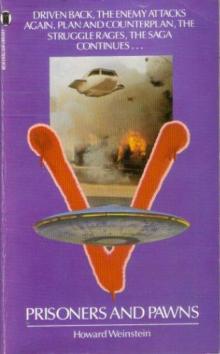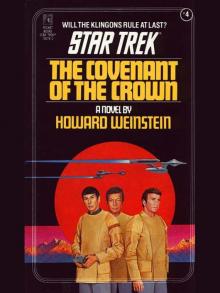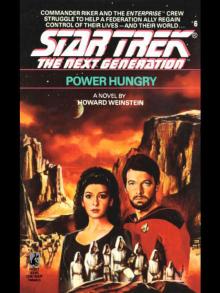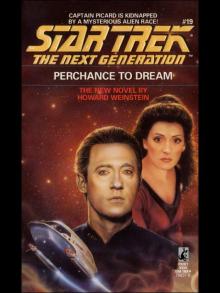- Home
- Howard Weinstein
POWER HUNGRY
POWER HUNGRY Read online
This book is a work of fiction. Names, characters, places and incidents are either the product of the author’s imagination or are used fictitiously. Any resemblance to actual events or locales or persons, living or dead, is entirely coincidental.
An Original Publication of POCKET BOOKS
POCKET BOOKS, a division of Simon & Schuster Inc.
1230 Avenue of the Americas
New York, NY 10020
Visit us on the World Wide Web
http://www.SimonSays.com/st
http://www.startrek.com
Copyright © 1990 Paramount Pictures. All Rights Reserved.
STAR TREK is a Registered Trademark of Paramount Pictures.
This book is published by Pocket Books, a division of Simon & Schuster Inc., under exclusive license from Paramount Pictures.
All rights reserved, including the right to reproduce this book or portions thereof in any form whatsoever. For information address Pocket Books, 1230 Avenue of the Americas, New York, NY 10020
ISBN: 0-7434-2086-1
POCKET and colophon are registered trademarks of Simon & Schuster Inc.
Table of Contents
Author’s Notes
Prologue
Chapter One
Chapter Two
Chapter Three
Chapter Four
Chapter Five
Chapter Six
Chapter Seven
Chapter Eight
Chapter Nine
Chapter Ten
Chapter Eleven
Chapter Twelve
Chapter Thirteen
Chapter Fourteen
Epilogue
About the Author
To Susan . . .
for sharing the voyage
Author’s Notes
It’s January as I write this. An old year gone, a fresh one just starting. A new President is taking up residence in the White House. A decade is nearly done. Hell, a whole century is winding down. What a time to be alive—a wondrous, terrifying time.
We’re so close to making great dreams come true. And just as close to destroying the only place we humans can call home. Surrounded by omens, we’re witnessing a duel between hope and hopelessness. And it’s too early to guess which combatant will win.
It’s the nature of science fiction to be ahead of its time, to peer through the mists of uncertainty, to offer a glimpse of a possible future. For decades, SF writers have told cautionary tales of civilizations fallen victim to self-inflicted calamities. In the past few years—and in 1988 in particular—we on earth have seen inarguable evidence that many of their auguries are coming to pass. Is it too late for us to change our ways?
There are some encouraging signs, however. Awareness of danger is half the battle. Finally, belatedly, there’s a dawning realization that we’ve landed ourselves in a heap of trouble.
The first 1989 issue of Time magazine is sitting near me as I write these notes. Each year Time devotes a major portion of its first issue to a profile of the Man of the Year—the person or group who, during the previous year, most affected the world for good or ill. This time, Time broke precedent and designated Endangered Earth as Planet of the Year. The cover story cataloged the multitude of ecological crises that dominated the news in 1988—beach and water pollution, destruction of rain forests, overpopulation, world hunger, the greenhouse effect, garbage disposal, nuclear waste, and more. Time’s conclusion: our planetary condition is critical, but not yet terminal. There are feasible solutions—if we have the will to put them into effect.
In the years I’ve been involved with Star Trek, as both fan and writer, I’ve seen plenty of evidence that Trek fans are not only good-hearted dreamers but doers as well. At many of the conventions I’ve attended, weekend activities have included collections for local food banks, blood-donation drives, charity auctions, and fund-raising raffles.
Can such individual efforts save the world? Of course not. Do they make it better? You bet. The problems of planet Earth may seem unsolvable when viewed as one gigantic, hopelessly tangled mess. But we can clear away a chunk here and there, and maybe we can grapple with problems reduced to a more manageable scale. Maybe the trick, then, is to put everybody to work on solving something.
Take hunger, for instance. Folksinger activist Harry Chapin tackled world hunger before most other celebrities. No, Harry did not conquer world hunger before his tragic death at thirty-eight in a 1981 auto accident. But he did set an example by doing two hundred concerts a year, half of them for charity. And he set a process in motion by involving people who later played key roles in such events as Live Aid and Hands across America. Those big events may be past, but lots of good folks, famous or not, are still working hard in communities all over, still fighting to get food to hungry people.
Harry Chapin’s work did not go unnoticed. In December 1987 I was one of several thousand people who attended a tribute to Harry at Carnegie Hall. A long list of musical stars—including Bruce Springsteen, Paul Simon, Pete Seeger, Kenny Rogers, Harry Belafonte, and Peter, Paul and Mary—came to sing Chapin’s songs and celebrate a life well lived. In honor of her husband, Sandy Chapin accepted the nation’s highest civilian award, the Congressional Gold Medal, which has been given to fewer than 120 people in American history—a select group that includes George Washington, Charles Lindbergh, Winston Churchill, Robert Kennedy, and Bob Hope.
Just recently, Harry Chapin’s unfinished final album was released. It is called The Last Protest Singer. The timeliness of some of the tunes is an eerie echo of Harry’s passionate vision and a reminder that we haven’t come far enough in the eight years since his death, I suppose. In one song, “Sounds like America to Me,” Harry sings:
When a child is hurting, silence can be wrong
I know when old folks are helpless, I can’t just pass along.
And I know when someone’s hungry, I can’t just sing this song.
And when I hear somebody crying,
I can’t just wonder who that it could be.
Well, I hear somebody crying now
And it sure sounds like America to me.*
*© 1981 Story Songs, Ltd. Lyrics used by permission.
Not only America, Harry.
Are we listening?
I hope so. And I hope you all enjoy this new novel.
Thanks.
Howard Weinstein
January 1989
P.S. I’d like to thank Gene Roddenberry for creating a Next Generation about which to write. I’ve enjoyed getting to know this new crew as much as I did the original.
I’d also like to thank Dave Stern and Kevin Ryan at Pocket Books, Dave McDonnell, Jonathan Frakes, Sharon Jarvis, Joan Winston, Joel and Nancy Davis, Peter Davis, Bob and Debbie Greenberger, Cindi Casby, Lynne Perry, Marc Okrand, my family, and Mail Order Annie for various forms of assistance, inspiration, and abuse. I could have done it without you, folks . . . but it’s better with you.
Prologue
STRING AND BRASS HARMONIES danced and soared, filling Will Riker’s cabin with the intricate contrapuntal melody of Pachelbel’s timeless Canon in D. The First Officer of the starship Enterprise reclined in his armchair, eyes closed, savoring the final notes, the crystalline trill of a solo trumpet.
When that last pure and perfect note had faded, Riker opened his eyes and propped elbows on knees, looking for reactions from his companions, Captain Jean-Luc Picard and ship’s counselor Deanna Troi, both seated facing him. “Deanna?”
“Absolutely beautiful.” Troi’s large dark eyes glistened with pleasure. “I’ve never heard that piece before.”
“It’s very old,” Picard said, “Seventeenth-century earth, I believe.”
“That’s right,” Riker said. “I’ve always been parti
al to baroque.”
“I had a hunch,” Troi said, punctuating with a gentle smile.
Picard’s eyes narrowed. “Imagine—we’re listening to music composed seven hundred years ago. . . . What a pity the creators of great art can’t know their work lives on long after they’ve gone to dust.”
The tall first officer leaned back again, hands clasped behind his head. “I wish I’d had the time to learn more about music, maybe try my hand at composing.”
“It’s never too late to learn something new,” Deanna said. “It would be refreshing for you to develop some new activities for your spare time.”
“That’s true—but then I’d need to develop some new spare time,” Riker said ruefully. He smiled. “My commanding officer keeps me pretty busy.”
The electronic tone of the cabin intercom sounded and was followed by the calm voice of Lieutenant Commander Data. “Bridge to Captain Picard.”
“This is Picard. What is it, Mr. Data?”
“We have received a priority code communication from Starfleet Command, sir.”
The captain and first officer exchanged concerned glances. “Pipe it down here.”
“Yes, sir.”
The comm screen over Ricker’s desk lit, displaying the Starfleet insignia. “Request voice print identification,” said the computer’s soft feminine voice.
Picard leaned forward and crossed his arms. “Picard, Jean-Luc, captain, U.S.S. Enterprise.”
“Voice print verified,” The insignia’s stylized starfield was replaced by a severe-looking woman in a wine-colored Starfleet uniform. She peered out from under dark bangs that were long enough to cover her eyebrows, and she spoke with a slight drawl. “Captain Picard, I’m Captain Kimberly Schaller, Starfleet Command. We’ve intercepted some Ferengi communications—looks as if they’ve developed quite an interest in the sector you’re headed for.”
“The Thiopan system?” Picard’s jaw tightened. “What sort of interest?”
“We believe they would like to make it part of their alliance. Thiopa is centrally located between our border and the Ferengi fringe systems. They’ve traded with other nonaligned planets out there, but haven’t been able to establish a heavy presence before. How familiar are you with Thiopa’s current situation?”
“I know the standard mission profile,” Picard said. “Which I take it is about to be substantially complicated?”
Schaller managed a small smile. “I’d say that’s an understatement, Captain Picard. We’ll feed all the latest information to your computers. I strongly suggest you and your senior staff review it before you get to Thiopa.”
“We shall. Should we expect a Ferengi presence in the area?”
“ ‘Expect’ may be too strong a word—what we intercepted wasn’t that specific. Let’s just say you should be cautious. I know you’re on a mercy mission, so I’m sure you would prefer to avoid a military confrontation with a Ferengi task force.”
Picard frowned. “The Ferengi are usually quite reticent to engage in direct combat. Does your information indicate a change of heart?”
“I can’t say for sure. But they do know the Enterprise is traveling alone with five automated cargo carriers. In their eyes, that might make you an enticing target.”
“Understood. We’ll be careful.”
“Very good, Captain Picard. If we get any other relevant information, we’ll transmit it to you as fast as possible. Schaller out.”
Picard faced his officers. “Your musical composing career will have to wait, Number One. We’d better get up to the bridge.”
Chapter One
Captain’s Log—Stardate 42422.5.
The Enterprise is two hours away from the Thiopan star system on what has become a dual-purpose mission. We are responding to an urgent request from Thiopa’s planetary government for Federation assistance in dealing with a critical drought and resultant food shortage. The Thiopans have only recently disengaged from a long-standing association with the despotic Nuaran Imperium. And now Starfleet has informed us that the Ferengi Alliance has designs on this sector. It is hoped our convoy of food and other desperately needed supplies will not only alleviate Thiopa’s crisis but will also give the Federation a chance to establish formal ties with the planet before the Ferengi can take advantage of the chaotic situation.
THE ENTERPRISE CRUISED SERENELY through open space with five stubby cargo ships trailing her in delta formation like ducklings tagging along behind their mother. The freighters were linked directly to the starship’s main computer; any changes in course or speed made by the Enterprise were automatically copied by the entire convoy. The only hindrance to the starship caused by the presence of the cargo drones was a reduction in speed; they were simply incapable of anything faster than warp three.
Jean-Luc Picard sat alone in the captain’s ready room just off the main bridge, enjoying the view of space offered by this chamber, a view unimpeded by the enhancements of viewscreen technology. Stars glowed in a rainbow of colors, veils of dust reflected and refracted the starlight shining through them, tendrils of gaseous material drifted and roiled like tinted smoke.
Picard found the sights of outer space endlessly fascinating, soothing and stimulating all at once—a paradox that never failed to please him. He enjoyed those sights here more than anywhere else. The ready room had become his favorite place on the ship, a sanctum for private pondering, yet only steps away from the main bridge.
But the very existence of this little refuge from the hurly-burly of command had come as something of a surprise. . . .
Darting like a skimmer-bug on a pond, the shuttle pod in which Picard was a passenger turned smartly and approached the maze of girders orbiting high over the ruddy surface of Mars. With a bit of free time on his hands, Jean-Luc Picard had hopped a supply transport on its way from earth to the Utopia Planetia Fleet Yards. It was a purely unofficial visit, but curiosity about the first of the new Galaxy class starships being built here was reason enough to come and take a look.
Cradled inside its construction bay, the U.S.S. Enterprise, NCC-1701-D, was still the object of intensive activity, with work crews swarming over her. She was now nearly complete, and Picard’s solemn features softened into a smile of satisfaction as he gazed at her.
“She is beautiful, Captain Picard?” Lieutenant Snephets, Picard’s escort, was an Oktonian female with four pale pink eyes. Like all Oktonians, she phrased statements as questions.
Picard replied with a nod and just a tinge of awe. “She is indeed, Lieutenant.” “She was, without a doubt, the most beautiful spacecraft he’d ever seen. He smiled inwardly at the affection he already felt for this vessel he would soon command. He suspected she’d be an easy ship to love.
Picard had spent the bulk of his career—for that matter, most of his adult life—as an explorer. For twenty-two years he’d commanded the deep-space trail-blazer Stargazer. She’d been a good ship, taken Picard and his crew through some dicey situations, but no one who’d lived aboard her would ever have described her as top of the line.
“Captain, a pleasure it has been working on Enterprise?”
Picard knew Lieutenant Snephets wasn’t asking a question, but her tone of voice compelled him to answer out of politeness. “I’m sure it has. She’s a most impressive vessel.”
Snephets skillfully docked the shuttle with the access port on the starship’s expansive flank. “You are greatly honored, sir, being her first commander?”
“Yes, Lieutenant, I am.”
The pod door slid open and a burly bearded man in a gold uniform greeted Picard in the corridor. “Engineer Argyle, sir. Welcome aboard. The bridge has been completed, if you’d like to see it.”
“I would indeed, Mr. Argyle.”
“This way, Captain.” He led Picard to a turbolift and they stepped in. “Bridge,” said Argyle as the doors shut. For a long, embarrassing moment, nothing happened. The engineer swallowed, repeated the order, and the lift finally started moving.
“Not quite shipshape yet, Mr. Argyle,” Picard said, with a hint of understanding.
“She will be, sir.”
They arrived at the bridge and stepped out. Picard stopped suddenly, gaping. The lighting, the space, the obvious attention to details . . . The Enterprise wasn’t going to be just another ship, he realized. It was going to be like home.
“Would you like to see the conference lounge and your ready room, sir?”
“Both right here on the bridge level?” Picard almost gaped again. “Isn’t that wasted space?”
Argyle couldn’t help beaming. “Not on the Enterprise, sir.”
An easy ship to love. Until he’d actually toured her from stem to stern, nothing could have prepared Picard for the sheer size and volume of the Enterprise. Quite simply, she represented a quantum leap in design and construction, beyond any other vessel in the fleet. And his first year in command had made him wonder how he’d managed to survive two decades in the comparatively cramped confines of the old Stargazer. It hadn’t taken long for him to come to appreciate every inch of “wasted space” built into the Galaxy class design—most of all, his personal retreat, his ready room.
Picard again skimmed the summary of Captain Schaller’s report on his desktop computer screen. Would the Ferengi really have the stomach for a confrontation? Fueled as they were by the thirst for profit, the Ferengi had demonstrated time and again that they preferred to avoid armed conflict whenever possible. But Picard’s own experiences with the Ferengi Alliance told him that vigilance would certainly be in order. More than likely, the Ferengi would be skulking about on the periphery, maintaining a low profile, cautiously keeping their hand in play and keeping an eye on what the Federation was doing. And there was no reason why they shouldn’t, since Thiopa was in free space.
The intercom tone sounded, followed by Riker’s voice. “Captain Picard . . .”

 V06 - Prisoners and Pawns
V06 - Prisoners and Pawns THE COVENANT OF THE CROWN
THE COVENANT OF THE CROWN POWER HUNGRY
POWER HUNGRY PRECHANCE TO DREAM
PRECHANCE TO DREAM Perchance to Dream
Perchance to Dream